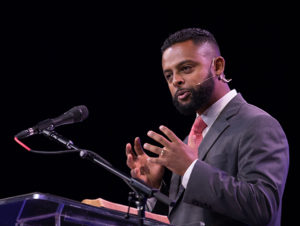Texas Baptists’ Family Gathering stressed unity
ARLINGTON—From a Lord’s Supper observance in the opening Sunday evening session to the final benediction Tuesday night, an emphasis on unity permeated worship services at Texas Baptists’ Family Gathering in Arlington.
“There is no more common element of family life than to gather around a table for a shared meal,” said Danny Reeves, president of the Baptist General Convention of Texas.
Remember and obey
Leaders of ethnic and affinity groups within Texas Baptist life read Scripture at the communion service—Elmo Johnson, president of the African-American Fellowship; Peter Le, president of the Vietnamese Baptist Fellowship; Rolando Aguirre, president of the Hispanic Baptist Convention of Texas; Pakon Chen, president of the Chinese Baptist Fellowship; Richard Ray, executive director of the Texas Baptist Bivocational/Small Church Association; and Jason Bryant, consultant for Western Heritage churches.
“We come together in an act of remembrance and an act of obedience,” said David Hardage, BGCT executive director. “We come to remember and obey.”
Advance God’s kingdom
Speakers throughout the Texas Baptist Family Gathering emphasized aspects of unity.

Nebiye Kelile, church planter and pastor of Pathway Church in the Dallas area, preached from Philippians 1:27-30 on the importance of unity in advancing God’s kingdom.
Kelile, who was born in Ethiopia and immigrated to the United States at age 2 with his parents, compared many churches to the S.S. United States—a mid-20th-century ship designed as a troop carrier capable of rapidly transporting 15,000 warriors into battle that became a luxury liner that accommodated 2,000 passengers on leisurely cruises.
Churches too easily can become focused on the comfort of patrons and serving their desires rather than on the mission of spreading the gospel and serving the communities in which God has planted them, Kelile asserted.
Churches should “stand firm in one spirit,” recognizing the eternal importance of the gospel they proclaim, he insisted.
“For the unbeliever, this is the closest he or she ever will come to heaven,” he said. “For the believer, this is the closest he or she ever will come to hell.”
Challenges to unity

David Dykes, pastor of Green Acres Baptist Church in Tyler, provided a historical retrospective on ways Texas Baptists have responded to challenges that threatened unity.
“Unity is so valuable because it is so rare,” Dykes said.
“Unity is a supernatural bond only God can create. We can’t create unity. We can keep unity, or we can kill it.”
Throughout their history, Texas Baptists have dealt with controversies, Dykes said. He pointed to divisions created by S.A. Hayden, who formed the Baptist Missionary Association; J. Frank Norris, who spawned several Fundamentalist Baptist movements; and most recently by the Southern Baptists of Texas Convention, a group that broke away from the BGCT in 1998.
“In spite of all the divisions in our past, Texas Baptist churches are alive and thriving,” he said.
Texas Baptists have maintained unity by emphasizing evangelism, missions, education, compassionate ministry and cooperative giving, Dykes said.
Shared devotion to Christ

Ralph West, pastor of The Church Without Walls in Houston, stressed unity must grow out of shared commitment to Christ.
“If Christ is our center, we cannot keep coming closer to him without coming closer to one another,” West said. “Christ is our peace. He doesn’t just offer peace. He is our peace.”
Just as Christ tore down the dividing wall between sinful humanity and a holy God, Christ’s people should be his instruments for breaking down walls of division, he said.
Who is in control?
In the closing worship service, attended by a large group of Hispanic young people, Pastor Jason Paredes from Fielder Church in Arlington preached an evangelistic message from John 18, contrasting the power of Jesus with the brokenness of Judas Iscariot and Simon Peter.

“We have a natural tendency to try to control our situations—to control our circumstances,” Paredes said.
Jesus genuinely was in control throughout his final hours, as he obediently followed God’s plan for his life and willingly “drank the cup” of suffering on behalf of sinful humanity, he observed.
On the other hand, Judas Iscariot tried to control events by manipulating them to advance his own self-interests, while fear and anxiety drove Simon Peter to deny Jesus three times, he noted.
“Every morning we wake up, we are either Peter or Judas all over again,” Paredes said.
In the end, the response of Judas and of Peter determined their destinies, he observed. Judas, plagued by guilt after betraying Jesus, continued to try to control his situation by taking his own life. Peter, however, acknowledged his helplessness and recognized his need for “the great I Am,” Paredes said.
He particularly challenged the young people who attended the worship service to “come to the end of self and look beyond self for help.”